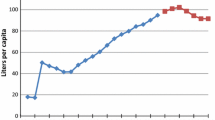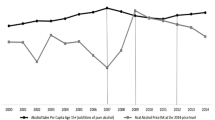Abstract
A number of theorists assume that drinking has harmful economic effects, but data show that drinking and earnings are positively correlated. We hypothesize that drinking leads to higher earnings by increasing social capital. If drinkers have larger social networks, their earnings should increase. Examining the Gen-eral Social Survey, we find that selfreported drinkers earn 1014 percent more than abstainers, which replicates results from other data sets. We then attempt to differentiate between social and nonsocial drinking by comparing the earn-ings of those who frequent bars at least once per month and those who do not. We find that males who frequent bars at least once per month earn an addi-tional 7 percent on top of the 10 percent drinkers’ premium. These results sug-gest that social drinking leads to increased social capital.
Similar content being viewed by others
References
Auld, M. Christopher. “Smoking, Drinking, and Income.” Journal of Human Resources, 40 (Spring 2005): 505–18.
Berger, Mark C. and J.Paul Leigh. “The Effect of Alcohol Use on Wages.” Applied Economics 20 (October 1988): 1343–51.
Burt, Ronald S. “The Contingent Value of Social Capital.” Administrative Science Quarterly 42 (June 1997): 339–65.
Cook, Philip J. “The Social Cost of Drinking.” In O.G. Aasland, ed. The Expert Meeting on the Negative Social Consequences of Alcohol Abuse. Oslo, Norway: Norwegian Ministry of Health and Social Affairs, 1991, pp. 49–81.
Corcoran, Mary, Linda Datcher, and Greg Duncan. “Most Workers Find Jobs Through Word of Mouth.” Monthly Labor Review 103 (August 1980): 33–35.
Dave, Dhaval and Robert Kaestner. “Alcohol Taxes and Labor Market Outcomes.” NBER Working Paper Series, Working Paper 8562, 2001.
French, Michael, and Gary Zarkin. “Is Moderate Alcohol Use Related to Wages? Evidence from Four Worksites.” Journal of Health Economics 14 (August 1995): 319–44.
Glaeser, Edward, David Laibson, and Bruce Sacerdote. “The Economic Approach to Social Capital.” NBER Working Paper Series, Working Paper 7728, 2000.
Granovetter, Mark. Getting a Job: A Study of Contacts and Careers. Chicago: University of Chicago Press, 1995.
Hamilton, Vivian and Barton H. Hamilton. “Alcohol and Earnings: Does Drinking Yield a Wage Premium?” Canadian Journal of Economics 30 (February 1997): 135–51.
Kawachi, Ichiro. “Summary of Research on Social Capital and Health.” World Bank's Discussion Group on Social Capital, February 10, 2000.
Leifman, Hakan, Eckart Kuhlhorn, Peter Allebeck, Sven Andreasson, and Anders Romelsjo. “Abstinence in Late Adolescence: Antecedents to and Covariates of Sober Lifestyle and Its Consequences.” Social Science and Medicine 41 (July 1995): 113–21.
Ligon, Ethan. “The Development and Use of a Consistent Income Measure for the General Social Survey.” GSS Methodological Report No. 64, Chicago: National Opinion Research Center, 1989.
MacDonald, Ziggy and Michael A. Shields. “The Impact of Alcohol Consumption on Occupational Attainment in England.” Economica 68 (August 2001): 427–53.
Montgomery, James D. “Social Networks and Labor-Market Outcomes: Toward an Economic Analysis.” American Economic Review 81 (December 1991): 1408–18.
Peters, Bethany L. Alcohol Consumption and Productivity. Doctoral Dissertation, Duke University, 2002.
Putnam, Robert. Bowling Alone: The Collapse and Revival of American Community. New York: Simon and Schuster, 2000.
Skog, Ole-Jorgen. “Social Interaction and the Distribution of Alcohol Consumption.” Journal of Drug Issues 10 (Winter 1980): 71–92.
Wechsler, Henry and Bernice Wuethrich. Dying to Drink: Confronting Binge Drinking on College Campuses. Rodale, NY: St. Martin's Press, 2002.
Weitzman, Elissa R. and Ichiro Kawachi. “Giving Means Receiving: The Protective Effect of Social Capital on Binge Drinking on College Campuses.” American Journal of Public Health 90 (December 2000): 1936–39.
Zarkin, Gary A., Michael T. French, Thomas Mroz, and Jeremy W. Bray. “Alcohol Use and Wages: New Results from the National Household Survey on Drug Abuse.” Journal of Health Economics 17 (January 1998): 53–68.
Author information
Authors and Affiliations
Additional information
We thank Daniel Arce, Phil Cook, Rodolfo Gonzalez, Teresa Beckham Gramm, Nick McKinney, Tom Means, Jake Vigdor, and participants in the Faculty Development Endowment seminar at Rhodes College for helpful comments and suggestions. We gratefully acknowledge Rhodes College for supporting this research through a Faculty Development Endowment grant.
Rights and permissions
About this article
Cite this article
Peters, B.L., Stringham, E. No booze? You may lose: Why drinkers earn more money than nondrinkers. J Labor Res 27, 411–421 (2006). https://doi.org/10.1007/s12122-006-1031-y
Issue Date:
DOI: https://doi.org/10.1007/s12122-006-1031-y




